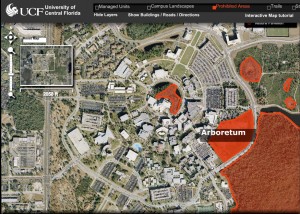The University of Central Florida prides itself in a decided shift towards environmental consciousness with newly implemented “green” projects. However, the integrity of UCF’s eco friendly program has been challenged by students and alumni due to the university’s recent request for the removal of protected status on land set aside as part of a plan for conservation.
The 7.8 acres of land UCF requested lose its protected status are part of the UCF Arboretum and are located near the University’s Organic Community Garden. In order to ensure the proposal meets the requirements outlined by St. Johns Water Management District, UCF offered a “swap” to protect an area of wetland on the outskirts of campus in exchange for the release of the 7.8 acres in dispute.

“The proposed swap area currently is in much better ecological condition than the area being released, and it serves as a buffer between campus and the Little Econ River,” UCF’s spokesman, Grant Heston, said in a statement.
Heston’s statement did not mention the reasons for the poor ecological condition of the area being sought after. But Emily Ruff, director of the Florida School of Holistic Living and UCF Alumna, gave KnightNews.com a history lesson about how she says UCF is responsible for the deterioration of the section of land, which under an easement guaranteeing protection from St John’s Water District since 2002, used to be a pristine ecosystem of native Florida plants.
Ruff, who has been working with organizations such as UCF’s Student Sustainability Alliance (SSA) to organize efforts to protect the Arboretum land, pointed out how a hurricane in 2004 caused the area to endure “moderate treefall.” Soon after, Ruff said UCF damaged the natural habitat and violated easement regulations by bulldozing, mulching and remodeling the natural land into what the UCF Board of Trustees called a “world garden,” replacing the natural Florida ecosystem with non native plants.
UCF Alumna Emily Ruff Shares Arboretum’s History
Found in violation of district policy, UCF was then issued a fine and ordered to remove the “world garden” and restore the area back to the state it was in before being subject to construction. UCF did remove the garden but failed to restore the area to the condition that it once was, Ruff said, although they already spent nearly twenty thousand dollars on seeds, trees and other materials that would be needed for restoration.
If the plea for repeal of the easement is approved, UCF will no longer have to pay the fine or restore the damaged land to the natural ecosystem it once was. In addition, new information has surfaced suggesting the wetlands proposed for protection in the swap appear to already be under protection by the 1984 Henderson Wetlands Protection Act requiring the Department of Environmental Protection to approve of mitigation plans prior to approving the development of wetland areas. If that’s the case, then before wetlands are developed, in order for there to be no net loss, the developer must have a working plan to either restore or create a new wetland area. Hence, critics argue, the proposed swap is more of an attempt to placate opposition than a fair deal.
Ruff pointed out that many of the students on UCF campus aren’t really aware of what’s going on.
“The construction happened years ago,” she said. “What most students today identify with that part of campus is the community garden, not the extremely biodiverse ecosystem that was destroyed beforehand.”
The garden is not within the easement area, or the Arboretum for that matter. However, it is in a “buffer zone” which is required for land surrounding the easement. So if there is no easement, there is no buffer zone, leading to an apparent “slippery slope.”
Critics say that there has been a definite lack of information about UCF’s plans for expansion concerning the Arboretum and other protected areas. After a great deal of pressuring from those opposed to UCF’s plans, the university offered one opportunity for students and faculty to take part in an open debate with members of administration.
However, notification was given three days before the scheduled date of the conference, during the week of the Thanksgiving holiday when few students remained on campus to hear the news. To date, Ruff says, this has been the only instance the university has humored its students in objection to repealing the protection of arboretum lands.
In order for UCF to begin executing plans for the disputed land, Governor Rick Scott must authorize the release of the protected area. Efforts are currently being made by various environmental organizations to gain support for the land under protected easement. Supporters of the cause can help by signing a petition at the Florida School of Holistic Living website.
Ruff says, “Directly contacting St. Johns Water District as well as Governor Rick Scott is as powerful as a thousand signatures on a petition.”
Although the proposed switch of protected land may appear environmentally sound, or “green” at a glance, Ruff believes a closer look at the facts will reveal a quite different story.
Heston says, “There are no definitive plans for the site at this point, but it will support research and academic facilities.”
Director of the Arboretum, Dr. Patrick Bohlen, explicitly notes that, “The University is pursuing release of the easement so that the area can be used for Academics and Research facilities…”
One can only speculate at what UCF administration may be planning to do with the Arboretum section in dispute, but given that the request is to repeal legislation protecting a piece of land, critics, like Ruff, are convinced it is quite clear that future plans don’t have the health of the natural habitat in mind.
Check back to KnightNews.com for our continuing coverage of UCF’s Arboretum Under Attack.





